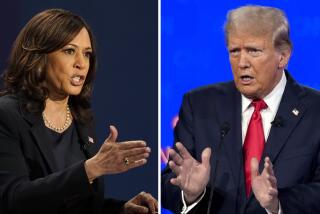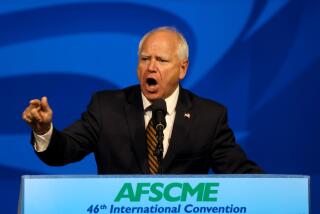Court Mulls Right to Bar Fringe Debate Candidates
- Share via
WASHINGTON — The Supreme Court wrestled Wednesday with the question of whether a state-owned, public television station has a free-press right to exclude a former American Nazi from participating in a candidates’ debate or whether the fringe candidate, having qualified for the ballot, has a free-speech right to be there.
Both choices appeared to trouble the justices. If the public TV editors can select two mainstream candidates and exclude all the others, it smacks of the government controlling the election, several justices said.
“Doesn’t that mean the minor-party candidates always lose out?” asked Justice David H. Souter. “Why isn’t that viewpoint discrimination?”
The court has often said that the 1st Amendment does not allow government officials to discriminate based on the viewpoint of a speaker. For example, a police chief could not permit a public demonstration by abortion-rights advocates, but deny the same request from antiabortion demonstrators because he favored one view over the other.
But the justices also worried about the impact of denying state officials the power to select speakers or writers based on their views.
“What about the University of Virginia planning a lecture series on public philosophy?” asked Chief Justice William H. Rehnquist. Does the 1st Amendment require it to include all interested speakers? Similarly, if the state university press publishes a book of essays, must it be open to everyone?
A lawyer for Ralph P. Forbes, the disappointed Arkansas congressional candidate who challenged his exclusion from a state TV debate, said that elections are different. When it comes to choosing among candidates, officials must step back and let the people decide, he said.
Rehnquist remained unconvinced. The states set qualifications for the ballot that exclude some candidates, he said.
“Suppose he is Willie Wacko, a write-in candidate, who is regarded by all observers as a total loser. Do they [officials] have to give him access” to the public TV debate? the chief justice wondered.
Not necessarily, replied Forbes’ lawyer, Kelly J. Shackelford. However, the TV network should be forced to include all candidates who had garnered 1,000 signatures and qualified to be on the ballot, he said. In 1992, the Arkansas Educational Television Network selected just the Republican and Democratic candidates for a debate. Forbes was excluded because he was not a “serious” candidate and had no real chance to win, network officials said.
A decision in the case (Arkansas Educational Television vs. Forbes, 96-779) is expected in several months.
More to Read
Get the L.A. Times Politics newsletter
Deeply reported insights into legislation, politics and policy from Sacramento, Washington and beyond. In your inbox twice per week.
You may occasionally receive promotional content from the Los Angeles Times.











